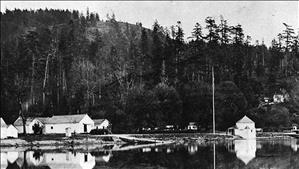On December 26, 1866, a problem arises between American and British forces jointly occupying San Juan Island when the British commander asks the American commander to return an English deserter who is serving as an American soldier on the island. The American officer refuses, and the issue goes up the chain of command. Though the incident has the potential to disrupt the friendly relations between the joint forces on the island, all involved will take steps to ensure that does not occur. The soldier is not returned but is soon transferred to the mainland, and the British commander is relieved of his position over the incident.
One Soldier, Two Countries
The 1846 Oregon Treaty settled nearly all the territorial claims in the Pacific Northwest between Great Britain and the United States, with one glaring exception: The San Juan Islands.
The resulting confusion over which country owned the islands eventually led to American and British forces jointly occupying San Juan Island in separate locations, aptly known as American Camp and English Camp, by 1860. This followed the well-known "Pig War" on the island the preceding year, a tense but bloodless episode between the two countries that stemmed from an American settler shooting a British pig. During the 12-year joint occupation relations between the two forces were cordial, though one little-known event had the potential to breach the peace.
On December 25, 1866, American Camp personnel hosted their British peers at a Christmas party. During the festivities, the British commander, Captain George Bazalgette, recognized one of the American soldiers, George Hughes, as a former Royal Marine. Hughes, a bugler, had deserted from English Camp in May 1861 and disappeared from the island. He served in the Washington Territory Infantry on the mainland for several years, and in 1866 enlisted in the U.S. Army in Portland, Oregon. In an ironic coincidence, he was assigned to San Juan Island and American Camp – as the bugler.
The following day, Bazalgette wrote American Camp commander Captain Thomas Grey and asked that Hughes be returned. Worried that this action might harm relations between the two countries, he also wrote his commander to tell him what he'd done. Though his superior assured him he was within his rights to ask for the return, Grey was not receptive to the request. An aggressive Irishman who exercised his authority on the island with gusto, Grey declined to turn Hughes over, responding to his British counterpart: "Not recognizing that you have any legitimate grounds for requesting this soldier to be turned over to you as a Deserter [sic], I therefore decline to comply with your request ... No one would regret the interruption of the 'good understanding which has always existed between the two camps' more than I should and I cannot but express my surprise at your anticipating in the case of Hughes any such result" ("Outpost of Empire"). But Bazalgette, a dyed-in-the-wool military man with his own ambitions, wasn't giving up so easily.
Conflict Avoided
Both men were astute enough to know the issue had the potential to grow into a bigger problem. They maintained their cordiality toward each other, but reported the incident to their superiors, who saw it in the same light. Grey was told not to enlist any new members or allow any deserters from the Royal Marines into American Camp, and Hughes was quietly transferred to Fort Steilacoom in the early spring of 1867. Great Britain reacted with similar dispatch. The Admiralty was annoyed that Bazalgette had demanded the surrender of an American soldier without asking for an investigation or even providing proof that the soldier was British, and relieved him of his command soon after Hughes's departure.
The joint occupation of San Juan Island ended in 1872 when German Kaiser Wilhelm I, acting as arbitrator, ruled that the San Juan Islands were American territory. By this time, both Grey and Bazalgette were long gone. Shortly before the Hughes incident, Grey was sued by an angry island resident for forcibly expelling him from San Juan Island. After he twice refused to accept service of the suit, Grey was relieved of command in the summer of 1867. The suit was later dismissed, and a year later he returned to the island for two months. But his career was essentially over, and he retired in 1870. Bazalgette returned to England and served in the miliary for another three years, but his career had similarly suffered, and he also retired in 1870. The available record on the erstwhile bugler, George Hughes, falls silent after his transfer back to the mainland.

